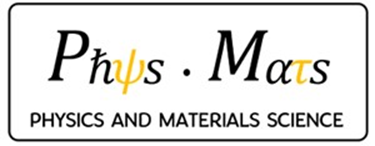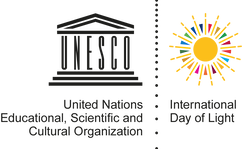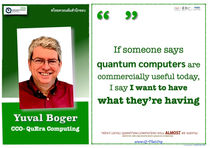(Q&A session) | QWorld: an Association to Brings Quantum Computing Researchers & Enthusiasts Together | #IYQ2025 & #ThaiYQ2025 | Paweł Gora | Aug 18, 2025 |
- K Sripimanwat

- 18 ส.ค. 2568
- ยาว 6 นาที
อัปเดตเมื่อ 27 ส.ค. 2568
๐ August 2025 ๐
(Questions & Answers - บรรยายและคำถามคำตอบ)
หัวข้อประจำเดือนสิงหาคม ๒๕๖๘
สนทนา #IYQ2025 & #ThaiYQ2025
.
(Q & A session: by - K Sripimanwat, Q-Thai.Org forum)
Thank you so much for your inspiring presentation, Dr.Gora. It was truly eye-opening to see how QWorld has grown as a global community committed to open and equitable access in quantum science. We’d love to follow up with a few deeper questions to help us better understand the essence of QWorld and explore more opportunities.
Question 1.?: The quote “training the next generation of quantum scientists” is both inspiring and reflective of QWorld’s open and collaborative philosophy. It reminds us of other successful global knowledge communities such as open-source software ecosystems. Could you share more about the origin of QWorld—how and why it was created, by whom, and how it developed up to its formal registration in Estonia just before the COVID-19 pandemic?
Answer:
The main founder and the first CEO of QWorld was Dr. Abuzer Yakaryılmaz, a researcher and educator from the University of Latvia, deeply involved in quantum computing outreach. The early team included collaborators from various countries who were passionate about quantum education and open science. In 2019, Dr Yakaryilmaz and his team from the University of Latvia contacted quantum researchers in several countries to organize quantum computing workshops based on the educational materials that they developed. Then, they traveled to several venues to conduct the planned workshops - the project was called “QDrive” https://qworld.net/qdrive. It was very successful, and during the meetings and workshops, an idea emerged to initiate an international collaboration aimed at democratizing access to quantum technologies by developing new, open educational materials and organizing workshops based on them. Initially, there were 5 QCousins (local, operational groups working together and acting locally): QLatvia, QPoland, QHungary, QTurkey, and QBalkan. Later, new QCousins joined. Eventually, to simplify the administration, be able to sign contracts, receive donations, and process everything legally, we founded QWorld Association - a non-profit organization formally registered in Estonia (Estonia was chosen in part due to its tech-friendly regulatory environment and digital infrastructure).
Q2 ?: QWorld's model of providing free training, workshops, and internship opportunities is quite admirable. Could you elaborate on the main sources of support for QWorld—both in terms of funding and in-kind contributions? How does the organizational structure sustain this initiative? What are the investment models or operating strategies behind the scenes? And what kind of value or benefits do founding members or local partners typically receive in return?
Answer:
As QWorld, we have several partners, sponsors, and supporters who donate to our activities (all of them or some of them). As the QWorld Association, we also participate in an educational project funded by the EU. However, ensuring operational sustainability is still challenging; we can afford to fund only some activities, while most of the work is done voluntarily. All QCousins are also encouraged to find sponsors and partners for their activities, and some of them manage to do it. Currently, QWorld does not support its QCousins financially, but supports their activities by providing educational materials as well as instructors and mentors, if needed.
Q3: During your talk, you mentioned online workshops that involve quantum annealing via the D-Wave platform. Could you tell us more about QWorld’s engagement with other quantum computing platforms, such as those developed by IBM, Google, or IonQ? Any plan to expand training and project-based collaborations with other hardware providers as well?
Answer:
Most of the educational materials developed in QWorld are in Qiskit and can be run on circuit-based quantum computers, like IBM’s. We also developed some materials in PennyLane and Cirq, some materials were developed using ProjectQ. Generally, we aim to develop and provide educational materials in different frameworks and for different quantum computing technologies.
Q4: While quantum computing appears to be the main activity so far, what about other domains of quantum technologies such as quantum communications and quantum sensing? Are there any ongoing or planned programs to broaden QWorld’s scope to cover these areas? If yes, when can we expect to see these developments?
Answer:
We also have a self-study module on QKD. Also, in the QIntern program, some projects are related to other quantum technologies.

Q5: As the global race in quantum technology accelerates, we’re also witnessing the rise of hype and exaggerated claims surrounding the word “quantum”—not just in media but even within parts of the scientific, policy, and commercial landscape. What is your perspective on this growing trend of “quantum hype”? And does QWorld plan to offer any training, workshops, or media responses to raise awareness or clarify misconceptions around quantum technologies?
Answer:
QWorld was founded on the principles of accessibility, scientific rigor, and community-driven education, which positions it well to push back against quantum hype in a constructive way. While QWorld doesn't aim to be a “watchdog,” it does recognize its responsibility to promote an accurate and nuanced understanding of quantum technologies.
As all our educational materials are open-source, they are reviewed, can be easily verified, and any mistakes all false claims can be easily found and fixed. We also ask our workshop participants for feedback. In addition, one of the formal requirements to establish a new QCousin group is having strong connections with academia, including support from some senior members. In our Guidelines for QCousins, we also formally declared that promoting pseudoscience and false claims may result in a person being prohibited from participating in QWorld.
Q6: Regarding national-level collaborations, how does QWorld view partnerships with government agencies, academic institutions, or professional organizations like the IEEE Quantum Technical Community? Do you see potential in inter-consortia cooperation to help accelerate the global ecosystem more efficiently—and if so, in what way could that be structured?
Answer:
QWorld is open to collaborating with institutions that share similar goals. We are members of a consortium working on the EU-funded "ADEQUATE" project. We also collaborate with several institutions on other projects. QWorld members are generally expected to have strong connections with academia, which supports collaboration and promotes a culture of openness.
Q7: As QWorld has a cousin in Poland, has there been any official support from the Polish government? Since we have seen other collaborative grants offered by the Polish Embassy to various countries—could this be a potential pathway for collaboration? Lastly, what are the near-term, mid-term, and long-term milestones that QWorld is working towards globally?
Answer:
QPoland hasn’t been supported by the Polish government yet. However, some of its events have been supported by other organizations in Poland.
Currently, QWorld is in the transition period - after several years, we are redesigning it to define new near-term and long-term goals. Here are the goals that QWorld formally approved in 2024:
To integrate QWorld with the global open quantum ecosystem.
To organize educational events, like workshops, hackathons, and lectures.
To have local groups (QCousins) responsible for organizing education and popularization of quantum technologies in their geographical regions (e.g., countries). We would like to have at least 50 active and sustainable groups by the end of 2027 year.
To have an active community of enthusiasts of quantum technologies sharing knowledge and contributing to discussions.
To give QCousins the opportunity to meet virtually or in person at least once per year.
To continue organizing the QIntern program at least by the end of 2027.
To continue developing educational materials.
To achieve long-term financial and operational sustainability.
To be an active member of the global quantum community (e.g., to participate regularly in quantum-related worldwide events like World Quantum Day).
Thank you again for sharing your thoughts, Dr. Gora. These insights will help us greatly as we look to build our community into the global quantum ecosystem.
— end of Q&A session #IYQ2025 & #ThaiYQ2025.
โครงการหนึ่งร้อยปีควอนตัมโลก ครึ่งศตวรรษควอนตัมไทย
100th World & 50th Thai Quantum S&T Anniversary
(เวปหลักโครงการ - Main Web)
(รายละเอียดและกิจกรรม - Proposal & updated activities)
Alliance:
Disclaimer:
- a public serving project by volunteers
no conflict of interest & none of personal agenda involved
๐
Welcome volunteers !
๐




























































ความคิดเห็น